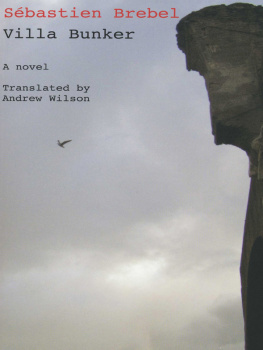Brebel Sebastien - Villa Bunker
Here you can read online Brebel Sebastien - Villa Bunker full text of the book (entire story) in english for free. Download pdf and epub, get meaning, cover and reviews about this ebook. City: New York, year: 2013, publisher: Columbia University Press, genre: Science fiction. Description of the work, (preface) as well as reviews are available. Best literature library LitArk.com created for fans of good reading and offers a wide selection of genres:
Romance novel
Science fiction
Adventure
Detective
Science
History
Home and family
Prose
Art
Politics
Computer
Non-fiction
Religion
Business
Children
Humor
Choose a favorite category and find really read worthwhile books. Enjoy immersion in the world of imagination, feel the emotions of the characters or learn something new for yourself, make an fascinating discovery.
- Book:Villa Bunker
- Author:
- Publisher:Columbia University Press
- Genre:
- Year:2013
- City:New York
- Rating:3 / 5
- Favourites:Add to favourites
- Your mark:
- 60
- 1
- 2
- 3
- 4
- 5
Villa Bunker: summary, description and annotation
We offer to read an annotation, description, summary or preface (depends on what the author of the book "Villa Bunker" wrote himself). If you haven't found the necessary information about the book — write in the comments, we will try to find it.
Villa Bunker — read online for free the complete book (whole text) full work
Below is the text of the book, divided by pages. System saving the place of the last page read, allows you to conveniently read the book "Villa Bunker" online for free, without having to search again every time where you left off. Put a bookmark, and you can go to the page where you finished reading at any time.
Font size:
Interval:
Bookmark:


Originally published in French as Villa Bunker by ditions P.O.L, Paris, 2009
Copyright 2009 by ditions P.O.L
Translation 2013 by Andrew Wilson
First edition, 2013
All rights reserved
Library of Congress Cataloging-in-Publication Data
Brebel, Sbastien.
[Villa bunker. English]
Villa bunker / Sebastien Brebel ; Translated by Andrew Wilson. -- First Edition.
pages cm
Originally published in French as Villa Bunker by Editions P.O.L, Paris, 2009.
ISBN 978-1-56478-853-5 (pbk. : alk. paper)
I. Title.
PQ2702.R42V5513 2013
843.92--dc23
2013007219
Partially funded by a grant from the Illinois Arts Council, a state agency
ISBN 978-1-564-78982-2 (e-book)

Cet ouvrage a bnfici du soutien des Programmes daide la publication de Culturesfrance/Ministre franais des affaires trangres et europennes
This work, published as part of a program of aid for publication, received support from CulturesFrance and the French Ministry of Foreign Affairs

www.dalkeyarchive.com
Cover: design and composition by Mikhail Iliatov
Content
Perched on a cliff above the sea, looming and hostile, secretly opposed to anyone staying is what shed written about the villa.
We see a house and we know immediately what sort of life is possible there. We contemplate its faade for a few minutes, we dont need to think rationally, nor linger before this unfamiliar house, shed also written (in her chaotic and crude handwriting, full of careless and ill-formed letters). It takes less than a minute to understand everything. If were going to be happy and lead an idyllic existence in this house, we already know it. If were going to be unhappy and have a miserable life there, we know that as well, just as surely, just as quickly. We know right away if well be able to live in this house, or instead if well be forced to abandon the idea of living there. Its fitness or unfitness for habitation is immediately apparent. Everything well experience, everything well think and feel there, we can see it already as though wed already lived it. In a matter of seconds, we can imagine our entire future existence in this house, we can see this life in minute detail and contemplate it as though it were over and done with. This perception (shed written) constitutes for us a truth, a certainty that will never be refuted, that we cant seem to get out of our heads. We imagine our possible lives in strange houses and, in the end, these existences pile up, one upon the other, somewhere deep inside us.
She turned on a faucet. The water, which was likely contaminated or poisoned by years spent in rusty pipes (she thought), ran red for several minutes. Shed made several trips to the supermarket during the day to stock up on cases of mineral water, now stored under the stairs.
Shed often stopped in the street to stare at the faades of houses, trying to imagine what life shed lead inside; in the past shed wondered many times while contemplating the front of an unfamiliar house: What would I have become if Id had to live between those walls, what would I be thinking right now if I wasnt here in the street but rather on the other side, enclosed in one of those rooms? She would stop in front of expensive houses, its true, but she was just as likely to stare at ugly, poorly maintained ones; in truth, she was liable to engage in this imaginary exercise in front of virtually any house. Now she couldnt take her eyes off the faade, she was counting the windows, calculating the number of rooms, she was imagining the wallpaper motifs, trying to perceive as many things as possible without getting any closer. Sometimes she would hear a musical instrument, she would listen to the sound of a piano and quickly gauge the ability of the person playing; she would guess all kinds of things about the houses occupants. Some faades were alarming and would bring thoughts of misfortune to mind. She would perceive the noxious character of these sordid dwellings immediately, picturing her own life there, under a pall of sadness and boredom; she would see her possible life as an empty succession of dark and dismal days.
We are in a kitchen with peeling paint on the walls, condensation on the windowpanes obstructs our view of the outside. The yellow light of the florescent bulb above the sink, the dripping faucet, the mop on the floor, so many details assaulting us in this kitchen smelling of disinfectant and boiled meat. The conversations next door, the noise of the trays and the scraping sound of chairs being moved. The words they speak seem so strident, so oddly chosen, they make our heads spin. And long afterward, condensation still lingers on the windowpanes, and gives only a hint of the grounds beyond. We dont know how this is possible. Time has passed, were not sure how much, we know that, in a way, the time spent in the kitchen doesnt count, we know of no measuring device capable of accounting for this time. We move to make sure were still alive, but if we leave this room all these sensations might collapse, no longer having anything to refer to, and then we will have to devise other thoughts, form an entire system of new thoughts in order to continue.
And in that same street, when we happen to glance at a stranger, we sense that strangers personality immediately, we sense his moods, his qualities and faults; he doesnt stay strange for long, this creature. Its enough to glance at him and his soul will open like a book, revealing the truth to us; now we know everything about him and are immediately in a position to judge the possible interactions we might have with this being, the kinds of relations we might maintain with him. If these relations are likely to turn ugly, become dangerous or simply intolerable, we know it immediately; we instinctively know we must avoid, even flee this potentially noxious being. Theres no point striking up a conversation with someone we dislike at first sight, any such conversation will always be disappointing and sterile; actually, theres no point in having any kind of relationship with such a being, for it will be torturous from the outset, a shipwreck. When it comes to those supposedly enigmatic and secret entities (our fellow creatures), the secret is theres no secret at all. We penetrate at a glance the murky depths of such beings, their supposedly inviolable interiors. Before even speaking with them, we break into their interiority and we know everything about them, the real nature of their thoughts and desires, the fundamental reasons for their actions, their unspeakable dreams. We penetrate to the core of such beings, floating unsuspected in their interiority; there, we move through vacant fortresses like flying saucers in space.
The villas front was completely without ornament, bare like a prison gate. The architect who had drawn up the exterior plan had certainly demonstrated his implacable hatred of ornamentation, systematically eliminating anything that couldve been mistaken for aesthetic ambition. Every faade is a statement, the front of every house a conscious intention. It was impossible to mistake it for something accidental, innocent, is what shed written. And a faade like that is hard to take when its without the slightest hint of decoration, or so shed thought while standing next to my father. They were there in front of the villa, they hadnt said anything for quite some time, captivated by the sight of it. They were probably searching for something to say, though they were sure there were no words to describe what they were feeling. My parents were standing silent in front of the villa, sheltered under the umbrella my mother was holding in her hand (it was raining constantly and, eventually, her arm would go numb); they were contemplating the faade as though it were a sinister painting depicting their life to come. At that moment, they werent sure what to think, it was as though their will was caught in an invisible net; perhaps they felt secretly attracted to this picture before them, as they measured for the first time the degree to which their life together had been determined by fate. Tired from the car ride, which had taken longer than expected, they had trouble concealing their reluctance as they turned down the uneven path. Everything about the faades design seemed the product of an ill-will, inexplicably opposed to even the mere suggestion of luxury or comfort, so shed thought glimpsing the faade through the windows of the car as it crawled slowly, like a hearse, down the gravel path, lined on both sides by overgrown hedgesthis path had given her the feeling she was traveling down a long narrow corridor leading toward death. In a sense, the faade was something of an architectural feat, shed said (or, rather, written) later while trying to recall her first impressions. Every line of thought began to aspire to its own erasure at the mere sight of this faade. The words lugubrious and cold had come to mind, and she was struck again by her inability to convey her exact impression. According to her, lugubrious and cold were too weak, theyd quickly become engulfed in a torrent of contradictory reevaluations. Shed experienced, she said, the limits of language, had foreseen her future wretchedness.
Next pageFont size:
Interval:
Bookmark:
Similar books «Villa Bunker»
Look at similar books to Villa Bunker. We have selected literature similar in name and meaning in the hope of providing readers with more options to find new, interesting, not yet read works.
Discussion, reviews of the book Villa Bunker and just readers' own opinions. Leave your comments, write what you think about the work, its meaning or the main characters. Specify what exactly you liked and what you didn't like, and why you think so.










